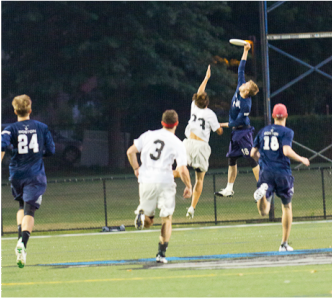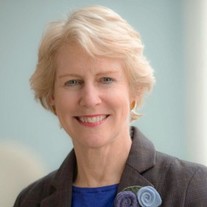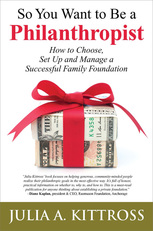 Playing Ultimate frisbee vs. attending the family foundation meeting? Playing Ultimate frisbee vs. attending the family foundation meeting? You may not be able to do anything but accept that fact. Just because the activity is a worthy one doesn’t mean that your children will find it (a) interesting, (b) something they are willing or able to make time for, or (c) turn them into mini-philanthropists in their own right. And if wails of "Mom always liked you best!" echo through the hallways at family gatherings now, don't expect that to change just because this is a "good deed" activity. I've worked with dozens of donors who set up their foundation with the primary goal of forcing, er, providing an opportunity for their children to work together in order to build strong family bonds. It's not always that simple. There are several things that can help. Most of them require that you, the donor, cede decision-making power to your children. Yes, I know that can be difficult for donors. But if your children's involvement is most important to you, it's a step that must occur. First, if possible, bring on all your children. Showing favoritism can lead to major issues. Additionally, if the board of directors of the family foundation consists only of you, your spouse, your long-time financial advisor and and your attorney, asking an 18 year old or even a 30 year old to hold their own in a discussion among such old fuddy-duddies is asking a lot — unless you provide them with a cohort that can amplify their voice. To address this try to bring on more than one younger generation trustee at a time. Second, be flexible.Your children (or grandchildren) are busy trying to get their start in life. And they may not have the ability to take time off work for a meeting during the week — or afford a babysitter for a weekend. Schedule the meetings to make it easier for their schedule rather than yours and if there are costs involved (travel, etc.) that are a hardship for them, consider covering their expenses. Third, be sensitive to the time crunch. Younger folks with children or exams have much less time available for outside the home activities. Allow them to take time off or elect to serve or not each year and still come back the following year. If board service becomes a burden and you make it clear that you believe your children aren't pulling their weight, you'll risk losing them completely from the foundation's activities. And you'll appreciate the leave policy when you need that hip replacement or long vacation! Lastly, jointly make a decision about how you'll make decisions. It is very common for everyone else on the board to defer to the matriarch or patriarch. Give the next generation an equal say in what the foundation funds, which criteria it uses to make choices, and how it evaluates its successes and failures. —Julia
1 Comment
 It's never too soon to introduce caring about others and the community. Your kids will imitate your actions so let them see you engage. It takes time, but it is quite simple. As you go about your charitable and community building activities, bring the kids along. At a certain age, they can be plopped at the back of a board room with crayons or an iPad. They won't hear or understand much (or anything) that is going on, but they will recall that their parents find it important to be involved in community activities. As children get older and you decide they're ready to receive an allowance, require that they divide their allowance into two or three pots: to spend, to save... and to donate. You can simply give your child three jelly jars or purchase items designed for this purpose, such as Moon jars. Then, once a year, ask your children what they care about — animals, children who need health care, people who need housing — and help them donate the money. Make it a family event to volunteer — collecting tickets at the PTA carnival, serving a meal at the homeless teen center, participating in clean-up day at the local park or beach. Volunteering as a family reinforces shared values. When you think the time is right, provide a small amount — $100 - $500 — to your children and have them work together to determine where it should be donated. (A good way to learn how to make decisions — and compromises.) You can even ask fellow foundation trustees, other family members or good family friends to serve as philanthropic mentors to your kids. There are some formal youth philanthropy programs where teens serve on grantmaking boards. Youth Philanthropy Connect is a national organization. Community foundations and Social Venture Partners are two places to look locally for these (the links lead to examples in Seattle), or go to Learning to Give for other ideas. —Julia  "I’ve always said that when it comes to influencing your children to be charitable, it’s not what you say, it’s what you do. Guess what? I was wrong." Ellen Remmer of The Philanthropic Initiative just posted this statement above on TPI's blog, Deep Impact. Like Ellen, I've spent years suggesting to clients concerned about their children's philanthropic urges that they should teach by doing. I still think that's a good idea -- I know how my mother's philanthropic activities affected me, even as I sat at the back of the room coloring while she participated in meetings -- but the Women Give 2013 study Ellen sites is fascinating. Ellen wrote: "it found that children whose parents to talk to them about giving are 20% more likely to give than those whose parents don't. And it found that talking actually matters more than role-modeling when it comes to parents influencing their children’s philanthropic behavior." Well, show and tell, I guess! —Julia  By mid-September 2013, So You Want to Be a Philanthropist will be available on Amazon. This lively, jam-packed book will allow those thinking about setting up a family foundation to ask the questions they should — before they do. And for those with a foundation that isn't functioning as they'd hoped, this book can help get you back on the right track. I'm excited about your reactions and look forward to hearing what you think! — Julia  On the evening of May 21st, a limited number of philanthropists will meet at the Threshold Group's invitation to hear Maggie Walker, Laurel Nesholm and Molly Hanlon (Walker Family Foundation, Nesholm Foundation and Hanlon Family Foundation respectively) have a conversation about the various ways they have engaged the next generation in their family's philanthropy. I'm delighted to facilitate this discussion about "Igniting the Full Potential of Your Family in Philanthropy" and if you'd like to attend, please contact Katrin Dietz at the Threshold Group at (206) 748-3695 or at [email protected]. —Julia |
AuthorJulia Kittross: Archives
September 2017
Categories
All
|

Julia Kittross | Philanthropy Sherpas
[email protected] | www.PhilanthropySherpas.com | 206.334.7995
[email protected] | www.PhilanthropySherpas.com | 206.334.7995
 RSS Feed
RSS Feed